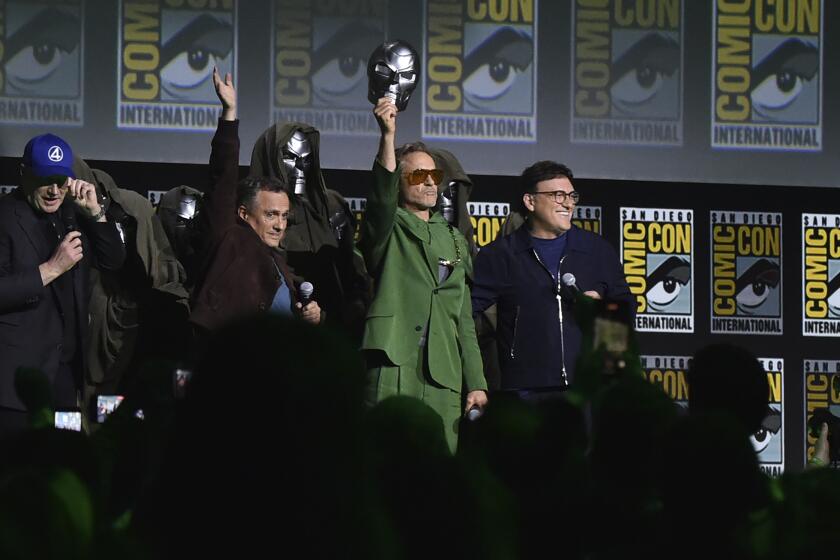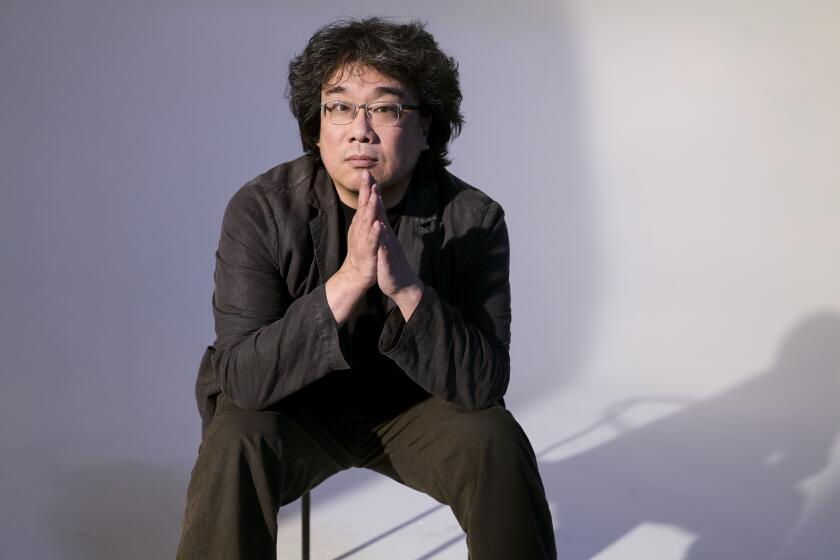Big bangs, but is that enough for your buck?
- Share via
With his sloppy, frantically busy action film “Once Upon a Time in Mexico,” Robert Rodriguez enters the realm of pure exploitation with a bang. Make that several thousand bangs.
As loud as any Chinese New Year, with the rat-a-tat-tat of heavy artillery beating out a ceaseless sonic tattoo, the writer-director’s movie comes across as a self-conscious ode to undiluted action, a raucous celebration of spectacle over sense and sensibility. To that end, instead of narrative, Rodriquez gives us noise; instead of characters, he gives us dead bodies -- lots of them.
This is the third film centered on Rodriguez’s signature character, El Mariachi, a Mexican guitar player and avenger who shoots as well as he strums. In 1993, the Texas-born director made a splash at Sundance with a Spanish-language feature centered on the guitarist, also called “El Mariachi.” The film was shot for about $7,000 and looked it, but Rodriguez’s eager, high-octane energy buffeted its flaws nicely. The only independent thing about the feature was its financing, which made it a perfect calling card for a young filmmaker who, steeped in action, was primed for studio paychecks. The director subsequently shot a follow-up with a fatter budget and less Spanish; he cast Antonio Banderas in the title role, launched Salma Hayek’s stateside career and called his new film “Desperado.”
Banderas and Hayek are back for “Once Upon a Time in Mexico,” but outside of their characters and some of the principal crew, there’s little in this new Mariachi film to connect it to the last. Breakneck fun, Rodriguez’s “Desperado” was a seamless fusion of old- and new-school action. The dusty milieu signaled that the filmmaker had slurped down his share of spaghetti westerns -- the latest movie is named after Sergio Leone’s savage masterpiece “Once Upon a Time in the West” -- yet it also moved dizzyingly, up-to-the-minute fast. The film featured the sort of zippy, Hong Kong-style gunplay and stunt work that were rapidly speeding up the rhythms of movie action, but it also felt totally home-grown -- it popped like a FM radio hit.
“Once Upon a Time in Mexico” moves even faster than “Desperado” does, but its action often feels chaotic, simultaneously lazy and agitated, rather than choreographed. Once again, El Mariachi is out for revenge, a mission that finds him taking on both a corrupt general (Gerardo Virgil) and the usual deranged drug kingpin (Willem Dafoe, whose bronzing makes him look as if he’d been steeped in some very strong tea). Gumming the works is a CIA agent, who may be a renegade or simply cracked. It’s impossible to say which, not only because Rodriguez’s screenplay doesn’t make much sense but also because the agent is played by habitual scene-stealer Johnny Depp with his trademark eccentricity: One moment the actor’s chewing his vowels like Brando, in the next he’s clogging his nose for some Nicholson twang.
Depp can’t save “Once Upon a Time in Mexico,” but he’s a happy and, as the movie wears on, necessary diversion. (The film was shot in 2001, a year before he slicked on eyeliner for “Pirates of the Caribbean.”) Duded out in a succession of deliberately goofy mustaches and outfits, his CIA agent helps move the story out of the serious, quasi-mythic register where Banderas and Hayek are stranded (and often abandoned), and into a more palatable comic mode. Depp’s genius for deadpan is particularly valuable here since it gives his role an absurdist topspin, adding layers and interest to a film lacking in both.
Rodriguez wants “Once Upon a Time in Mexico” -- as well as its relentless violence and bloodied bodies -- to come across as fantasy, not reality. Certainly, with its video-game death count and mechanical rhythms, which for the first time seem calibrated to the sound of gunfire rather than to the Mariachi’s heartbeat, the film could not be further removed from real life.
Aside from Depp’s agent, the characters only prick Rodriguez’s interest when they’re riddled with bullets. (El Mariachi rarely leaves the shadows.) If the filmmaker had given us beautiful images or impressive technique in place of people and story, the movie’s impersonal quality would be tolerable. But the poorly lighted, digital video cinematography lacks texture and subtlety, and the lurching construction feels as if it was edited with a blender.
The irony is that as Rodriquez has taken on greater filmmaking responsibilities -- he also shot, scored and edited, or in the parlance of the credits, “chopped” this feature -- the Mariachi movies have become less and less personal.
There’s more heart and soul in his lucrative “Spy Kids” adventures, which though uninteresting as cinema have the virtue of young characters enlivened by a pulse. A wonderful actor and unmistakably human presence, Depp can animate even the most industrial Jerry Bruckheimer product, but he isn’t a miracle worker. He eases the sting of Rodriguez’s “Once Upon a Time in Mexico” and reassures us that the film’s go-for-the-joke mayhem has nothing to do with how we live in the world.
Depp’s performance reminds us that, yeah, it’s only a movie -- just not a good one.
*
‘Once Upon a Time in Mexico’
MPAA rating: R, for strong violence and language
Times guidelines: A lot of violence and gore; some strong language
Antonio Banderas...El Mariachi
Salma Hayek...Carolina
Johnny Depp...Sands
Mickey Rourke...Billy
Eva Mendes...Ajedrez
Columbia Pictures and Dimension Films present a Troublemaker Studios production, released by Columbia Pictures. Director, writer, cinematographer, editor, composer Robert Rodriguez. Producers Elizabeth Avellan, Carlos Gallardo, Robert Rodriguez. Costume designer Graciela Mazon. Casting Mary Vernieu. Running time: 1 hour, 37 minutes. In general release.
More to Read
Only good movies
Get the Indie Focus newsletter, Mark Olsen's weekly guide to the world of cinema.
You may occasionally receive promotional content from the Los Angeles Times.










